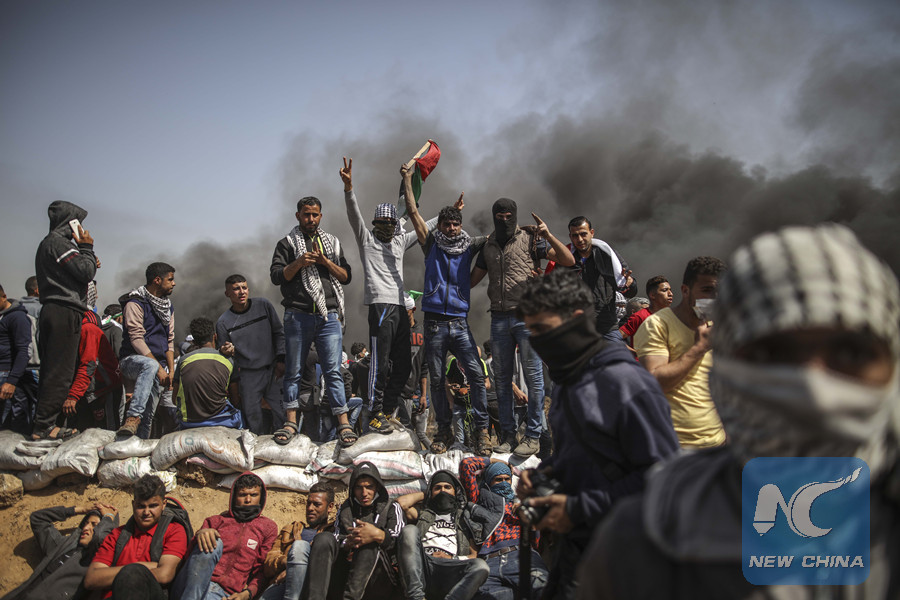
Palestinian protesters take part in clashes with Israeli troops on the Gaza-Israel border, east of Gaza City on April. 6, 2018. (Xinhua/Wissam Nassar)
GAZA, April 8 (Xinhua) -- A few hundred meters away from the border fence between the Gaza Strip and Israel, a group of young Palestinians sat near a tent, enjoying the traditional poetry and music played by aged Mahmoud Abu Diab.
The dark night did not prevent Abu Diab, a refugee originally from Beer Sheva in northern Israel, from joining a mass Palestinian rally that demands the return of Palestinian refugees.
March 30 was the start of a six-week anti-Israel protest, which is expected to peak on May 15, the day after the 70th anniversary of Israel's declaration of independence but marked by the Palestinians as the Nakba Day, or "Day of the Catastrophe."
Sitting near the tent, the 70-year-old man amused young people with his traditional poetry about Palestine's right to return.
"Oh old days, hopefully you will return and we are sitting here in spite of the Jews," Abu Diab, who wore the traditional Palestinian costume, sang amid the cheers of the audience.
Feeling homesick, the old man also expressed his happiness as he can smell the breeze of his nearby town of Beer Sheva.
"Being here today is a message that we will never give up our right to return to our homeland," Abu Diab told Xinhua, adding that the peaceful protest will continue until the entire world acknowledges the right of the Palestinian refugees to return.
The mass protest, known as the "Great March of Return," is a very creative idea and a strong message to the world that the issue of the Palestinian refugees has not been resolved yet.
The Palestinian refugees' struggle to return home has been one of the key and thorniest issues in the final status negotiations between Palestinians and Israelis.
Near Abu Diab's tent, groups of young Palestinians performed traditional Dake dance around flames of fire they lit for lightening and warmth.
Palestinians have pitched dozens of tents along the Gaza-Israel border as part of the protest. The tent cities are erected in agricultural lands 700 meters away from the border fence in eastern Gaza.
Not far away from Abu Duab's tent, Um Khaled, a Palestinian refugee from Jafa near the Israeli city of Tel Aviv, came to the rally with her daughter and son-in-law to demand their right of return.
"It is not only a help for the people at the rally, but also a revival of the Palestine heritage," the woman in her 50s said while making traditional Palestinian bread for the protesters.
"I will join any activities calling for our return until this dream comes true," she said.
Um Khaled is not the only woman to join the rally.
Near her tent, a group of old women were cooking a traditional Palestinian food known as Somagiya.
"We want to feed the people at the rally. This dish is always made on happy occasions and this rally is one of the best occasions for us," one of the women told Xinhua.
Since the beginning of the anti-Israel rally, 29 Palestinians, including a journalist and two children, have been killed, and about 800 others injured, with 79 in critical condition, according to the health ministry in Gaza.

